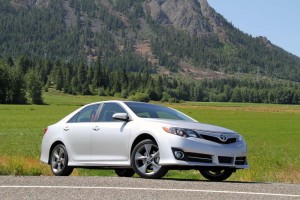Plagued by a strong yen that is making it increasingly difficult to produce cars in the home market, Japanese giant Toyota Motor Co. may shift production of more of its popular Camry sedans to the U.S.
Toyota plants in North America already provide the majority of the vehicles the maker sells in the U.S. and Canada, notably including the 25-year-old Camry factory in Georgetown, Kentucky. But, according to the Nikkei business daily, such a move – not yet confirmed by Toyota – would be used to supply the Camry to South Korean Toyota dealers.
Japanese makers, in general, have been struggling to deal with production at home with exchange rates slashing their profitability. Makers like Toyota had, until recently, been hoping the yen would stabilize at or just above 80 to the dollar, but in recent weeks it has soared to a record high of 75.94.
That is making it increasingly unprofitable to ship vehicles not only to the States but to other countries that tend to peg their own currencies to the American dollar.
South Korea is a relatively small but nonetheless important market for Toyota, the Camry generating 4,200 sales there last year, making it among the best-selling foreign nameplates in a country that has generally rejected imported brands.
If Toyota moves ahead, South Korean Camrys would be added to the line in Georgetown – according to industry sources the goal would be to launch production of the newly redesigned model in 2012.
Toyota has steadily expanded production in North America, adding its newest plant in Tupelo, Mississippi after a several year delay.
The Japanese maker – which will likely slip to third in terms of global sales this year as a result of the March 11 Japanese earthquake and tsunami – produces a higher percentage of its vehicles in the home market than any key competitor. But that could change.
In the week of the March disaster, CEO Akio Toyoda acknowledged, “If you look at it logically, it doesn’t make sense” to build cars in a country so prone to disasters and one that is also being hammered by lopsided exchange rates. Such problems have already led makers like Nissan and Honda to shift more and more of their own production abroad.
That said, the CEO earlier this year insisted, “Toyota is a company that was born and raised in Japan and we can’t just abandon it because the environment is difficult. Instead, said the grandson of the company’s founder, Toyota would “grit our teeth and protect Japanese manufacturing.”
But the apparent decision to shift some more Camry production abroad would suggest that even a CEO with deep ties to his home country can only go so far.


Well you covered what I would have written in the 5th paragraph… Toyota is getting a lot of mileage (pun intended) from this non-story. Sounds like the jobs are just around the corner for ‘mericans that want to work. Hail Toyota; great savior of the American working man.
oh… 4,200 a year? Um…
The Korean market is so protected from imports (not just from the US) that Japan accounts for around 1-2% of their market, despite a similar mix of small cars. They stick a 8% tariff on imports, then additional taxes based on engine size (regardless of fuel economy, or CO2 emmissions). Of course, these taxes “cascade” so the 8% tariff is more like 15%.
…And there’s always that threat of an income tax audit for those who make “lavish” purchases like imported cars. Oh yeah, they promise not to do that anymore 😉
Small, perhaps, but just one more step in the hollowing out of Japan’s industrial base. See the other story we posted today:
http://www.thedetroitbureau.com/2011/10/honda-to-cut-japan-exports-in-half/
Paul A. Eisenstein
Publisher, TheDetroitBureau.com
Point taken about production moved from Japan, but I really intended more of a commentary on Korean protectionism (though that might not have been obvious). Frankly, there aren’t many opportunities to point it out because most people simply assume they have no use for American cars because of their size/quality/economy etc. But you show them that the most popular Japanese car doesn’t fair well either, (gasp!) they might accept the notion of Korean protectionism and wonder why in the hell both sides of the politcial isle can’t wait to lower the minimal 2.5% tariff we add to Korean auto imports.
Point taken, Carmine. Yes, the Koreans are protectionist…almost to the degree of the Japanese. But there is a growing market for European cars, interestingly. I saw a surprising numbers of Mercedes and BMW products on the road in Seoul last year.
Paul E.